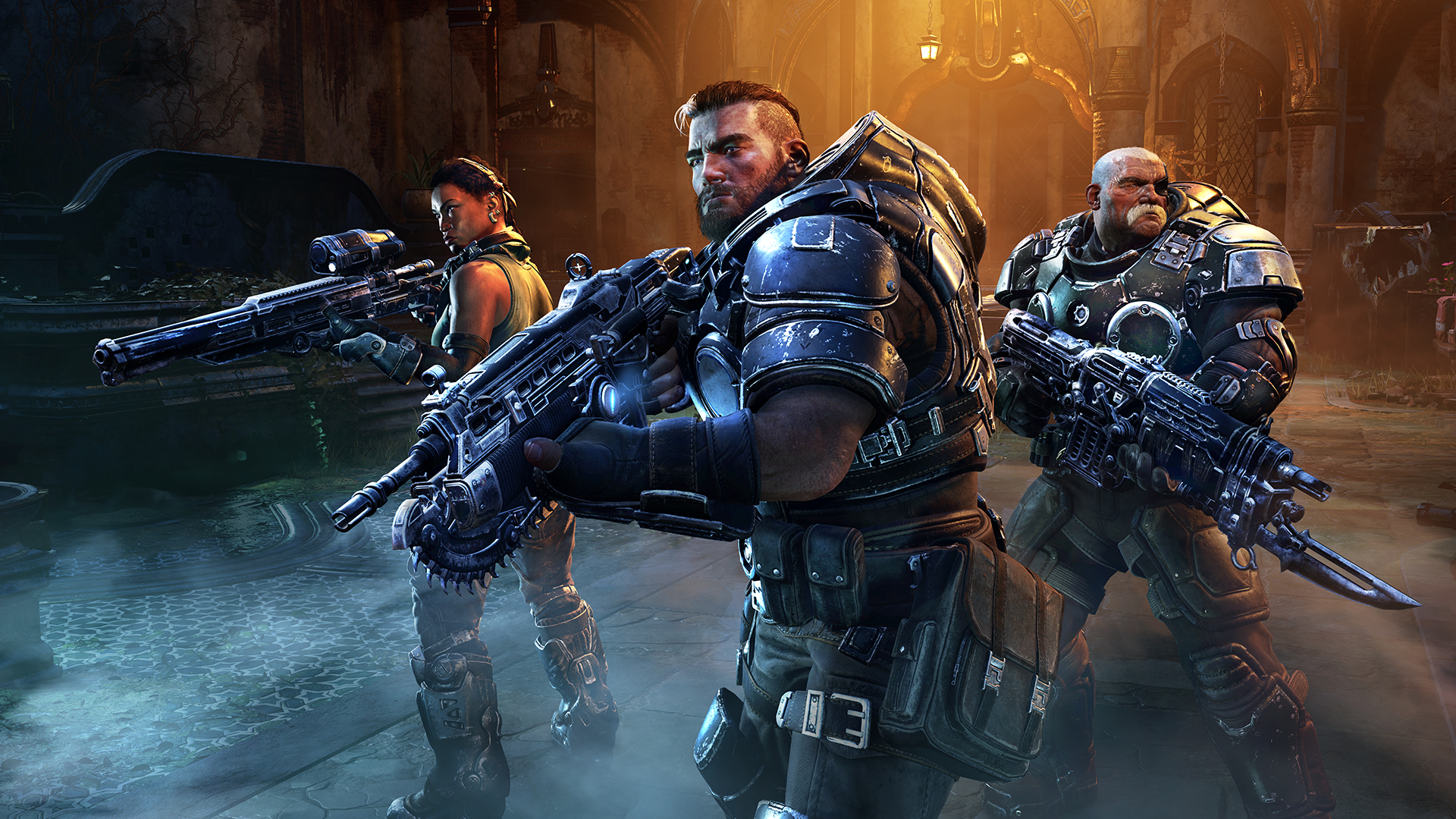GamesRadar+ Verdict
Gears Tactics is a smart, fast, and aggressive strategy game that's in need of a little more variety
Pros
- +
The combat is quintessential Gears of War
- +
Captures the essence of the series' action
Cons
- -
Lacks variety in mission and encounter design
- -
Difficult to invest in story or characters
Why you can trust GamesRadar+
Gears Tactics desperately attempts to strike a balance between turn-based strategy and all-out aggression. It's a surprisingly tight line for a genre title to walk, with the contemplative nature of the former tenet of design at odds with the hawkish ethos informing the latter. Splash Damage and The Coalition should be commended for how smartly the collaborating studios have been able to translate the character of Gears' combat to a new arena, even if some of its spirit has gone AWOL in the transition.
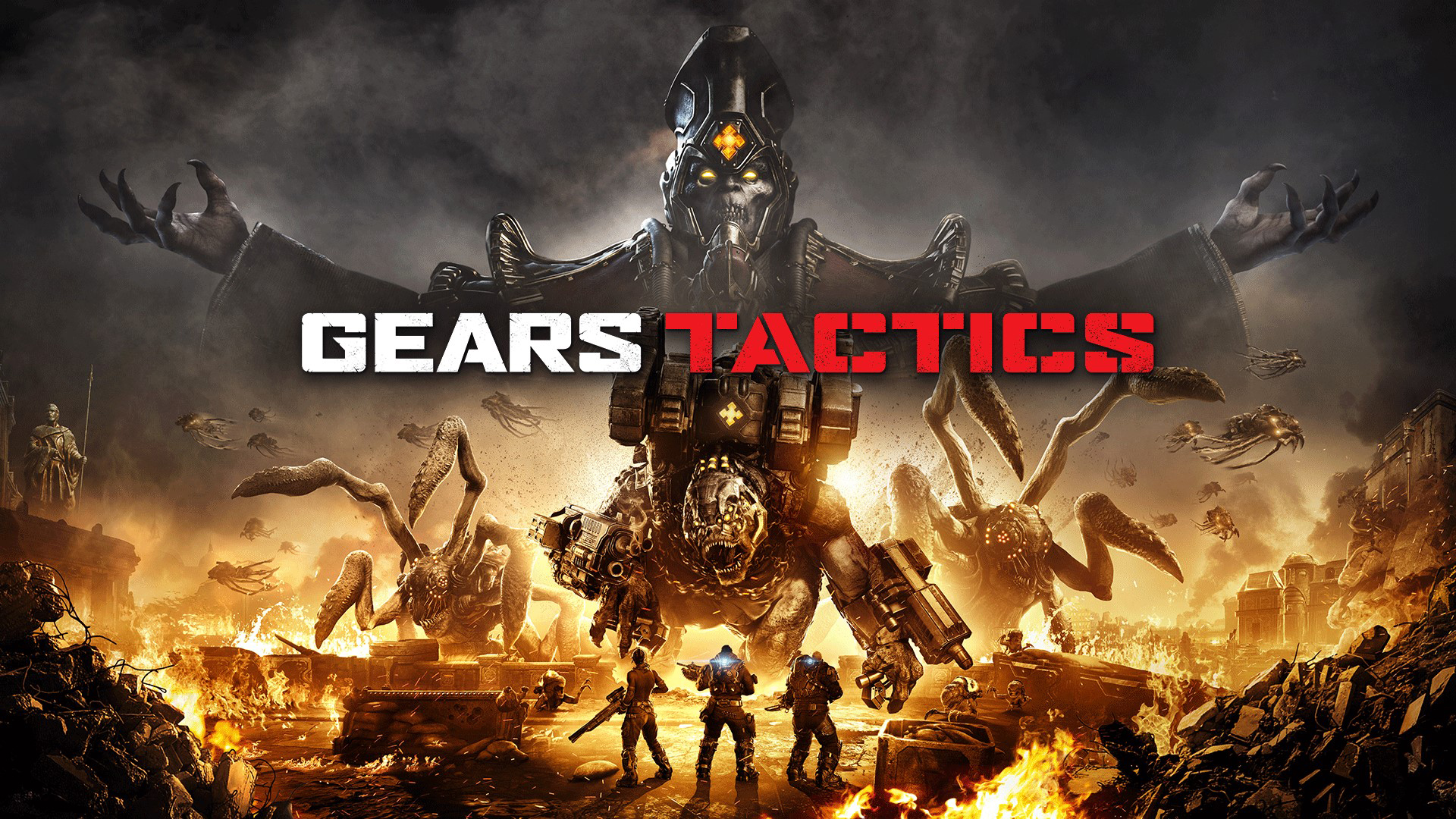
Release date: April 28, 2020
Platform: PC
Developer: Splash Damage, The Coalition
Publisher: Xbox Game Studios
The game moves at a fast clip, with each of its turns defined by the amount of viscera you're able to pull from guts to ground. Even as Gears Tactics has you easing off the throttle of the thumbsticks, it's still a game of fluid motion and crisscrossing firing lines. Maneuvers may be executed with the click of a mouse rather than the tease of a trigger but it's no less engaging. You'll still find yourself in search of flanking routes, carving out holes in enemy lines with your Lancer, and locking yourself into waist-high cover to avoid returning enemy fire – the Locust as formidable a foe as ever.
Gears Tactics is fast, smart, and aggressive in its action, but sadly it can be slow, shallow, and meek in the way that it threads you between encounters and attempts to hold your attention once the bullets stop flying. Tactics is, for better or worse, still a Gears of War game at heart, even if the camera has been torn out from the shoulder and hoisted high into the sky.
A fresh perspective
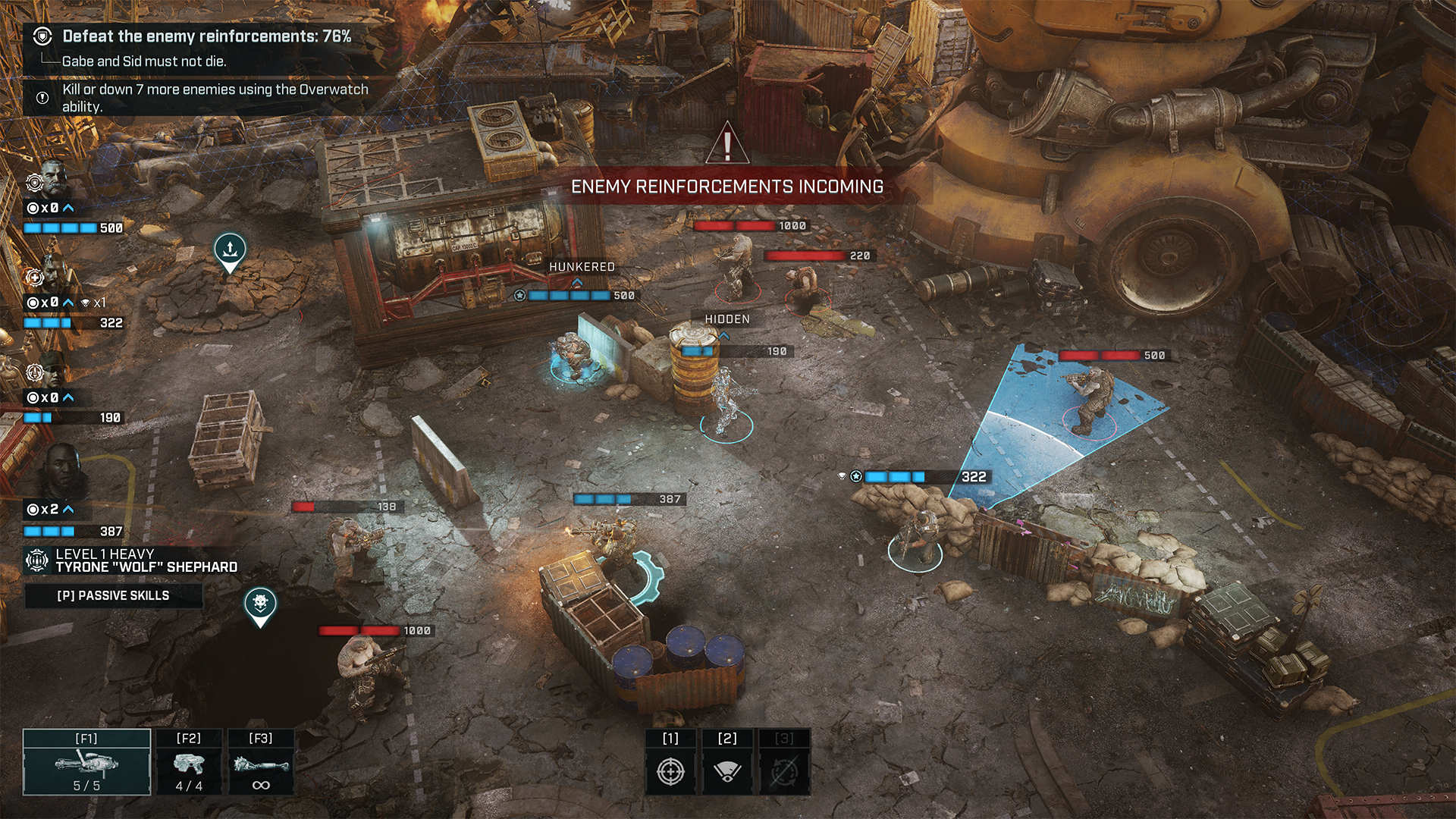
If you're looking for a way to frame all of this, then look no further than XCOM. The inspiration is clear, with Gears Tactics clearly owing a debt to Firaxis' particular brand of turn-based strategy. Still, Gears Tactics makes a number of smart decisions that do more than enough to not only set it apart from its contemporaries but make its action feel authentically Gears of War too. The most notable of which are in the decisions to remove the movement grid and the way that the cadence of play is paced.
For starters, with movement removed from a grid you have more freedom to experiment than you would typically expect from a turn-based strategy game. Gears Tactics takes a freeform approach to combat, with each of your Gears equipped with a baseline of three action points that can be spent at your discretion on any combination of movement, shooting, and skills. This seemingly small decision unlocks so much potential, making Gears Tactics feel more like a traditional action game than you might expect it to be capable of.
You're able to quite effortlessly weave between points of cover, with action-point cost mitigated by ensuring that your unit clicks into waist-high debris at the end of a run. You're able to rotate freely between any of your Gears in the field in any given turn too, which means that you can quite readily respond to threats as they emerge from the fog of war, airdrop into the sprawling arenas, and crawl out of those pesky Emergence Holes. You can choose to stand and fire until you expend your action points, move soldiers into advantageous positions and then shoot, or use your squad in any combination that you can think to command. Gears Tactics has taken the core XCOM combat system, identified the wrinkles, and ironed them out to make for a faster and more aggressive strategy game.
Gears Tactics carves out its own space in the genre, thanks in no small part to some smart mechanics that have been factored into the moment-to-moment. A subtle revision of the Overwatch mechanic – a cone represents your zone of sight, anything moving within it triggering a combat action – has a more aggressive application, used to thin encroaching enemy lines rather than hold down defensively advantageous positions. Another sees the ability to replenish an action point for your entire squad by performing grizzly executions on downed enemies – a staple of the Gears of War games, its implementation here is fantastic.
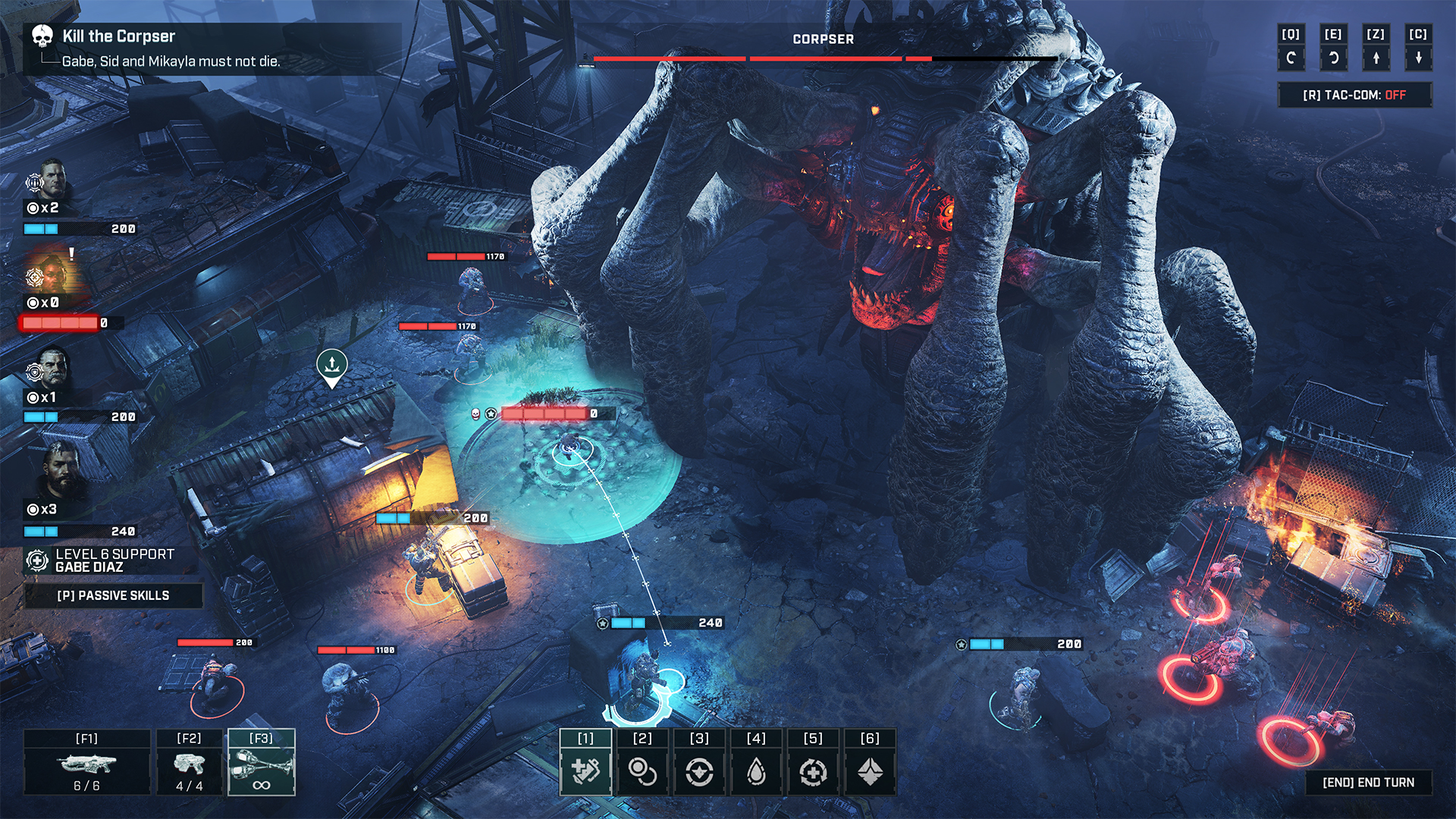
"It feels like a Gears game first and foremost, rather than some strategy game wearing its skin"
In fact, so many of the systems at play here work to feed into the feeling that you're playing a Gears game first and foremost, rather than some strategy game wearing its skin. Gears Tactics relishes the opportunity to push masses of enemies at you, particularly once you begin to push through the game's later encounters. Utilising the strength of your squad combined is only part of the puzzle. Victory is earned only by chaining together skills and executions.
Gears Tactics features five specialised classes (Heavy, Scout, Sniper, Support, and Vanguard) that can be upgraded and heavily customised throughout the game, each with its own strengths and limitations, offset by their utility in engagements. Building out a balanced squad is key, as is ensuring that the skills learned by each unit are complementary to the others deployed on any given mission. Skill trees let you loosely invest in one of four combat proficiencies, each giving you access to new Active and Passive abilities that can help you mitigate the hordes of enemies constantly flowing in your direction.
Gaming this system is where Gears Tactics really comes into its own; it's possible to create huge chains of death and dismemberment by properly balancing unit strengths, flanking routes, the pulsating rumble of a Lancer's chainsaw, and those all important executions. There's a real joy to be had in taking down nine or more enemies in a single turn without your squad sustaining a single point of damage. This is a game designed around continuously pushing forward and building momentum. Every one of the game's systems and mechanics is geared towards that style of play. Gears Tactics rewards aggressive action and punishes those that attempt to divert from that ethos by overwhelming you with enemies, resulting in the loss of squad members. Still, some of you will find the lack of variety a little grinding eventually; the game struggles to offer room for much else in its structure or mission design.
Prepare for war
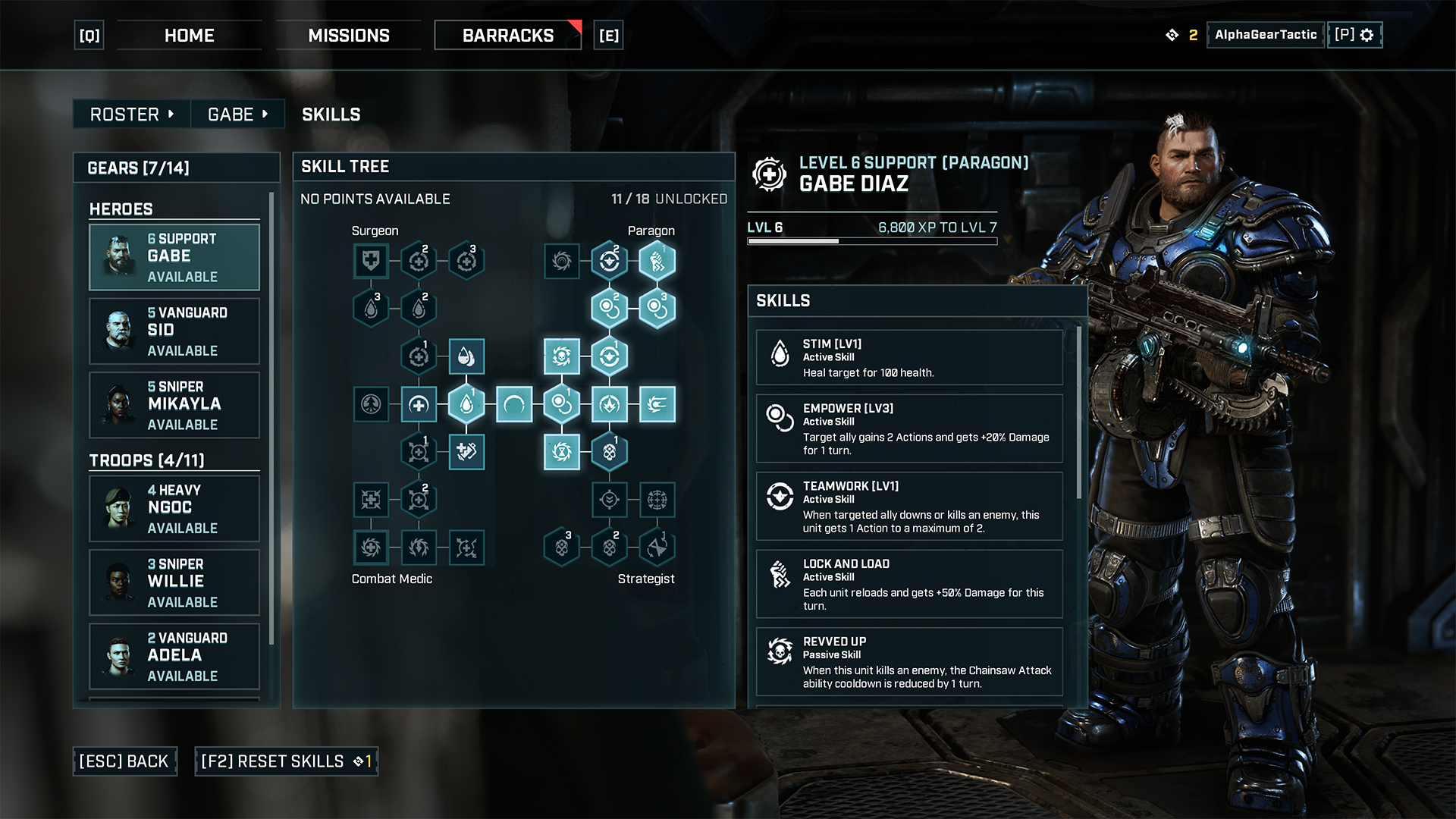
While there's some pretty clean XCOM comparisons to be drawn, the way Gears Tactics handles downtime is a little lacklustre by comparison. While your squad spends much of the game in motion, travelling as part of a convoy with a group of Gears in-training, there's no base to grow and evolve, and no similar lines of broader progression to speak of. Instead, you'll spend time levelling up units, customising the look of your favourites, and pouring through lists of weapon and armour attachments to work out the best combinations.
You'll find plenty of equipment as you play, rewarded for hunting down storage crates in-amongst the chaos of combat and for completing mission modifiers, although you'll soon have so much of it that it soon becomes a little perfunctory. Gears of War was never a series designed to have you sat in menu screens, and that a legacy Tactics can't escape.
But the cadence to Gears Tactics combat is wonderful. It's the type of game that you can easily lose hours to, and it can be challenging enough that you're likely to. That isn't to say that it is without fault, however. As great of a job Gears Tactics does with replicating the momentum of Gears' combat, it isn't able to so easily capture the essence of the series outside of its fixation on violence. You're looking at a 20-hour story here with a real lack of heart; the focus on family that is present and accounted for in every Gears game is largely MIA here, making it difficult to care about the characters or their situation.
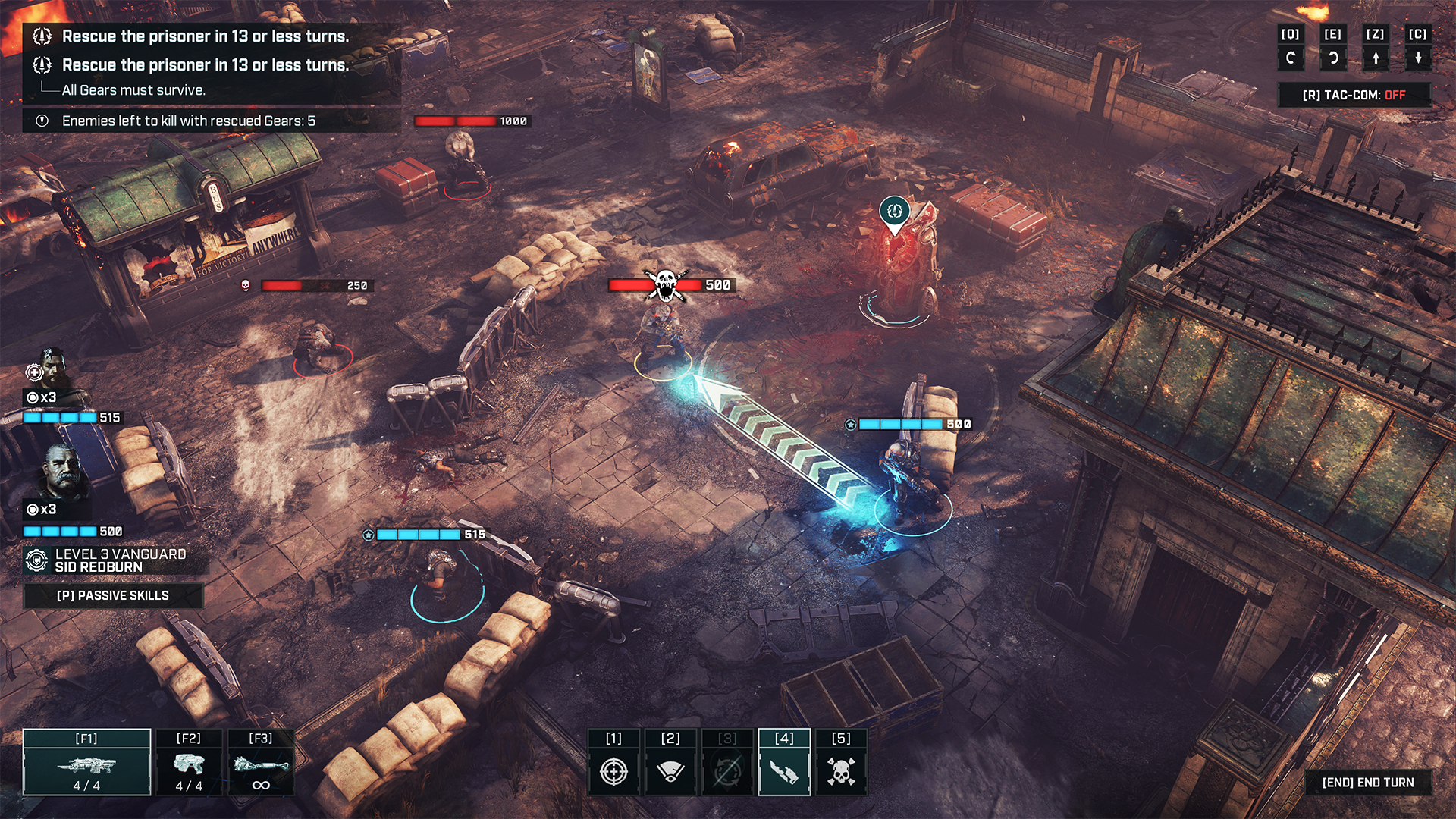
"So fixated on forward momentum that any attempt it takes to breathe feels suffocating"
Story driven strategy games (there's no multiplayer options in Gears Tactics) aren't easy to pull off, and it's clear that plenty of lessons could – and should – have been learned from StarCraft 2: Wings of Liberty and the benchmark it, and its various expansions, set years all those years ago in this respect. The cutscenes and character work lacks the polish and depth that we've seen reflected in The Coalition's Gears of War 4 and Gears 5 too; Gears Tactics comes across as stiff and spliced together, rather than this cohesive adventure that you're excited to see through to the end.
Compounding this further is some rather ponderous encounter design, laced together by a bland mission structure. Repeat objectives, often across repurposed maps, quickly lose their lustre. Gears Tactics also forces side-quests, designed to break up the campaign and push you to try new squad compositions, but these missions are among the most lifeless portions of the game. Gears Tactics is so fixated on forward momentum that any attempt it takes to breathe feels suffocating.
There's a lot to love in Gears Tactics. The ebb and flow of the action is strong enough that it can be easy enough to overlook its flaws, but they are still there – present and accounted for. It's a game desperately in need of a little variety; perhaps the same can be said of the core franchise games too, but it's particularly noticeable when there's a degree of separation between a command and the resulting action.

Josh West is the Editor-in-Chief of GamesRadar+. He has over 15 years experience in online and print journalism, and holds a BA (Hons) in Journalism and Feature Writing. Prior to starting his current position, Josh has served as GR+'s Features Editor and Deputy Editor of games™ magazine, and has freelanced for numerous publications including 3D Artist, Edge magazine, iCreate, Metal Hammer, Play, Retro Gamer, and SFX. Additionally, he has appeared on the BBC and ITV to provide expert comment, written for Scholastic books, edited a book for Hachette, and worked as the Assistant Producer of the Future Games Show. In his spare time, Josh likes to play bass guitar and video games. Years ago, he was in a few movies and TV shows that you've definitely seen but will never be able to spot him in.
